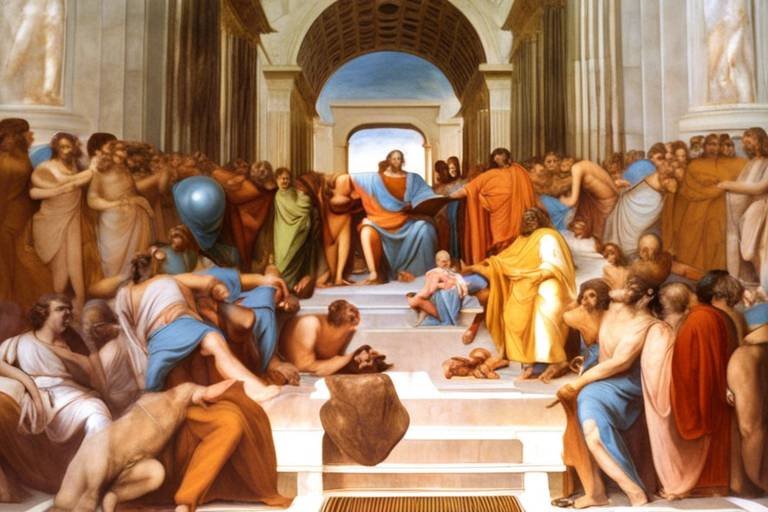Hindu Philosophy and its Reflections in Indian Politics
Hindu philosophy is a rich tapestry of ideas that has woven itself into the very fabric of Indian society, influencing not just spirituality but also the political landscape. When we think about how spiritual beliefs shape governance and policy-making, it’s fascinating to see the interplay between ancient wisdom and contemporary issues. This article delves deep into the intricate relationship between these philosophies and their impact on Indian political thought, revealing how concepts like Dharma, Karma, and Moksha provide a moral compass for leaders and citizens alike.
The essence of Hindu philosophy is not just confined to rituals or traditions; it extends into the realm of ethics and governance. For instance, the principle of Dharma emphasizes righteousness and duty, guiding leaders to make decisions that are not only politically sound but also ethically grounded. Imagine a world where political leaders are held accountable to these ancient principles—what a transformative impact that could have on society!
As we explore this connection, we will uncover how historical texts like the Vedas and Upanishads have laid the groundwork for political ideologies that continue to resonate today. These ancient scriptures are not just relics of the past; they are living documents that inform and inspire modern political thought. Moreover, the contributions of philosophers like Chanakya have provided strategic insights that remain relevant, demonstrating the enduring nature of Hindu philosophical thought.
In the context of contemporary India, the influence of Hindu philosophy can be seen in the drafting of the Indian Constitution. Principles such as justice, equality, and the welfare state are deeply rooted in these ancient ideas, showcasing how they have evolved yet remained pertinent in modern governance. This blending of ancient wisdom with contemporary legal frameworks raises important questions about identity, representation, and the role of spirituality in a secular state.
As we journey through this exploration, we will also examine the rise of Hindu nationalism and its philosophical underpinnings, which have sparked significant debate and discussion in Indian politics. The dynamics of national identity and political discourse are profoundly shaped by these ideas, and understanding this relationship is crucial for grasping the complexities of modern Indian society. In essence, Hindu philosophy is not just a historical artifact; it is a living, breathing force that continues to influence and shape the political landscape of India today.

The Foundations of Hindu Philosophy
Hindu philosophy is a rich tapestry woven from a multitude of spiritual beliefs and ethical principles that have evolved over thousands of years. At its core, it seeks to provide answers to some of life’s most profound questions: What is our purpose? How should we live? And what happens after we die? To navigate these existential inquiries, Hindu philosophy introduces several key concepts, the most notable being Dharma, Karma, and Moksha.
Dharma can be understood as the moral law combined with spiritual discipline that guides one’s life. It is not merely a set of rules but a dynamic concept that reflects one’s duty, righteousness, and the ethical path one must follow in life. Each individual’s dharma can vary based on their age, caste, gender, and occupation, making it a deeply personal and situational guideline. This principle encourages individuals to act in ways that uphold societal values and contribute positively to their communities, thus laying the groundwork for ethical governance.
Next, we delve into Karma, a concept that encapsulates the law of cause and effect. Essentially, it posits that every action has consequences, shaping not only the present life but also future reincarnations. This understanding fosters a sense of personal responsibility, urging individuals to make choices that align with their dharma. The belief in karma instills a moral compass that transcends individual actions, influencing societal norms and expectations. In the political realm, this can manifest as a commitment to justice and accountability, guiding leaders to make decisions that benefit the greater good.
Finally, we arrive at Moksha, the ultimate goal of human existence in Hindu philosophy. Moksha represents liberation from the cycle of birth, death, and rebirth (samsara) and signifies the soul's return to its divine source. This aspiration for spiritual freedom encourages individuals to seek deeper understanding and connection with the universe, promoting values such as compassion, humility, and selflessness. In the context of governance, the pursuit of moksha can inspire leaders to prioritize the welfare of their citizens, fostering a society that values spiritual growth alongside material wealth.
In summary, the foundations of Hindu philosophy are not just abstract concepts; they are practical guidelines that influence individual behavior and societal structures. By embracing dharma, karma, and moksha, individuals and leaders alike can create a governance model that is ethical, responsible, and ultimately beneficial for society as a whole. The interplay of these principles forms a philosophical framework that is deeply rooted in Indian culture, shaping the moral and ethical dimensions of political thought throughout history.
- What is Dharma in Hindu philosophy? - Dharma refers to the moral duty and ethical path that one must follow in life, which can vary based on individual circumstances.
- How does Karma influence our lives? - Karma is the principle that every action has consequences, which affects not only the current life but also future reincarnations.
- What is the significance of Moksha? - Moksha represents liberation from the cycle of life and death, signifying the ultimate goal of spiritual freedom in Hindu philosophy.

Historical Context of Hindu Political Thought
The historical evolution of Hindu political thought is as rich and layered as the culture it stems from. To truly understand how Hindu philosophy has shaped Indian politics, we must take a journey through time, tracing its roots from ancient scriptures to modern ideologies. The ancient texts, particularly the Vedas and Upanishads, serve as the bedrock of Hindu political philosophy, embedding ideas that resonate even today. These texts are not just spiritual guides; they provide a framework for governance and social order that has influenced rulers and politicians for centuries.
In the early days, political thought was deeply intertwined with the concept of Dharma, which refers to the moral duties and responsibilities of individuals in society. This principle dictated not only personal conduct but also the responsibilities of rulers, emphasizing that governance should be aligned with ethical and moral values. The notion of Karma, the law of cause and effect, further reinforced the idea that leaders are accountable for their actions, shaping a political landscape where justice and righteousness were paramount.
As we move through history, we encounter significant figures who have left an indelible mark on Hindu political thought. One such figure is Chanakya, an ancient philosopher and strategist whose treatise, the Arthashastra, is a seminal work on statecraft. Chanakya emphasized practical governance, advocating for a ruler's shrewdness and wisdom in maintaining power and order. His ideas reflect a blend of ethical considerations and pragmatic strategies, illustrating how ancient philosophies were not merely theoretical but were applied to real-world governance.
In the medieval period, the influence of Hindu political thought continued to evolve. The Bhakti movement, which emphasized devotion and personal connection to the divine, also had political implications. Leaders of this movement often challenged the established hierarchies and advocated for social justice, thereby influencing political discourse. This era saw the emergence of regional powers that incorporated Hindu philosophical tenets into their governance, promoting a sense of identity and unity among their subjects.
Fast forward to the modern era, and we find that Hindu philosophy has not only persisted but has also adapted to contemporary challenges. The struggle for independence from colonial rule was significantly influenced by leaders like Mahatma Gandhi, who drew upon Hindu principles of non-violence and truth to galvanize the masses. His approach to politics was deeply rooted in spiritual beliefs, merging the philosophical with the political in a way that was both revolutionary and reflective of ancient wisdom.
Today, the legacy of Hindu political thought is evident in the fabric of Indian democracy. The principles of justice, equality, and welfare, which are enshrined in the Indian Constitution, echo the ancient philosophical teachings that have guided rulers throughout history. This continuity highlights the enduring relevance of Hindu philosophy in shaping not just political ideologies, but also the collective conscience of Indian society.
As we look to the future, it is essential to recognize that the historical context of Hindu political thought is not static; it is dynamic and evolving. The interplay between ancient wisdom and contemporary political realities will continue to influence India's path forward, making it a fascinating area of exploration for scholars, politicians, and citizens alike.
- What are the main texts that influence Hindu political thought?
The Vedas and Upanishads are foundational texts that provide ethical and moral frameworks for governance. - How did Chanakya influence Indian politics?
Chanakya's work, the Arthashastra, emphasizes practical governance and statecraft, combining ethical considerations with strategic action. - What role did Gandhi play in integrating Hindu philosophy with politics?
Gandhi utilized Hindu principles of non-violence and truth to inspire the independence movement, merging spirituality with political activism.

The Role of the Vedas and Upanishads
The Vedas and Upanishads stand as monumental pillars in the edifice of Hindu philosophy, deeply influencing political thought and governance in India. These ancient scriptures are not merely religious texts; they encapsulate a wealth of knowledge that addresses the moral and ethical dilemmas faced by society. The Vedas, composed around 1500 BCE, are primarily hymns and rituals, while the Upanishads, which emerged later, delve into philosophical discussions and the nature of reality. Together, they provide a comprehensive framework that informs the ethical responsibilities of leaders and the governed alike.
One of the core concepts derived from these texts is Dharma, which refers to the moral law that governs individual conduct. In the context of governance, Dharma serves as a guiding principle for rulers to ensure justice and fairness. This idea posits that a leader's legitimacy is inherently tied to their adherence to Dharma, making it a cornerstone of ethical leadership. The Upanishads further expand on this by emphasizing the interconnectedness of all beings, which fosters a sense of social responsibility and accountability among leaders.
Moreover, the Vedas and Upanishads introduce the concept of Karma, the law of cause and effect, which underlines the importance of actions in shaping one's destiny. This principle is crucial in political contexts, as it encourages leaders to act with integrity and foresight, knowing that their decisions have far-reaching consequences. The ethos of Karma fosters a culture of accountability, where leaders are expected to be mindful of their actions and their impact on society.
The significance of these texts extends beyond individual morality; they also provide a blueprint for governance. For instance, the idea of Moksha, or liberation, emphasizes the ultimate goal of human existence, which can be interpreted in a political sense as the pursuit of a just and equitable society. Leaders who aspire to create a harmonious society must align their policies with the principles outlined in the Vedas and Upanishads. This alignment can be seen in various aspects of governance, including law-making, social justice initiatives, and community welfare programs.
To illustrate the impact of the Vedas and Upanishads on political leadership, consider the following table that outlines key philosophical concepts and their implications for governance:
| Concept | Description | Implications for Governance |
|---|---|---|
| Dharma | Moral law governing individual conduct | Guides leaders to ensure justice and fairness |
| Karma | Law of cause and effect | Encourages accountability and integrity in leadership |
| Moksha | Ultimate liberation | Promotes the pursuit of a just and equitable society |
In contemporary India, the teachings of the Vedas and Upanishads continue to resonate in political discourse. Leaders often invoke these texts to legitimize their policies and actions, appealing to a rich heritage that emphasizes ethical governance. However, the challenge lies in interpreting these ancient principles in a manner that addresses modern complexities. As society evolves, so too must the understanding of these texts, ensuring that they remain relevant in guiding the ethical landscape of Indian politics.
In conclusion, the Vedas and Upanishads are not just relics of the past; they are living texts that continue to shape the moral fabric of Indian society and its political landscape. By integrating these ancient philosophies into contemporary governance, leaders can foster a society that values justice, accountability, and social responsibility—principles that are as vital today as they were thousands of years ago.

Key Philosophers and Their Contributions
Throughout the rich tapestry of Hindu philosophy, several key thinkers have emerged, each leaving an indelible mark on political thought and governance. These philosophers not only shaped spiritual beliefs but also provided frameworks that influenced rulers and statesmen. One of the most notable figures is Chanakya, also known as Kautilya, who authored the ancient treatise, the Arthashastra. This work is often regarded as one of the earliest texts on political science and economics. Chanakya emphasized the importance of Dharma (righteousness), Artha (wealth), and Kama (pleasure) as essential components of a balanced life, which in turn, informed his views on governance.
Chanakya's approach to statecraft was pragmatic and often ruthless. He believed that a ruler must be shrewd, utilizing strategies that could include espionage and manipulation to maintain power and ensure stability. His famous quote, "Before you start some work, always ask yourself three questions – Why am I doing it? What the results might be? And Will I be successful?" highlights his strategic mindset. This kind of thinking laid the groundwork for future political leaders in India, who sought to balance ethical governance with the practicalities of ruling.
Another significant philosopher is Adi Shankaracharya, who played a pivotal role in the revival of Hindu philosophy in the 8th century. His teachings on Advaita Vedanta emphasized the idea of non-duality, suggesting that the individual soul (Atman) is identical to the ultimate reality (Brahman). This perspective encouraged rulers to adopt a more inclusive approach to governance, promoting harmony among diverse communities. Shankaracharya's philosophy has implications for political identity, urging leaders to foster unity rather than division.
Moving into more contemporary times, we find the influence of Mahatma Gandhi. His philosophy of Satyagraha (truth-force) and non-violence reshaped the political landscape of India. Gandhi's belief in the moral duty of individuals to uphold justice and truth resonated deeply within the Indian independence movement. He advocated for a governance model that prioritized social equity, communal harmony, and grassroots participation. Gandhi's ideas continue to inspire modern political movements, emphasizing the need for ethical leadership and social responsibility.
In addition to these figures, there are numerous other philosophers and thinkers who have contributed to the evolving dialogue of Hindu political thought. For instance, Rabindranath Tagore and Dr. B.R. Ambedkar brought unique perspectives that challenged traditional norms and advocated for social reform. Tagore emphasized the importance of cultural identity and nationalism, while Ambedkar, a champion of social justice, critiqued the caste system and fought for the rights of marginalized communities. Their contributions reflect the dynamic interplay between philosophy and politics, illustrating how ancient teachings can be reinterpreted to address contemporary issues.
In conclusion, the contributions of these key philosophers have created a rich legacy that continues to influence Indian political thought today. Their ideas provide a foundation for understanding the ethical dimensions of governance and the importance of aligning political action with spiritual values. As India navigates its complex political landscape, the teachings of these thinkers remain relevant, offering insights that can guide future leaders in their quest for a just and equitable society.
- Who was Chanakya and why is he significant in Hindu philosophy?
Chanakya, also known as Kautilya, was an ancient philosopher and strategist whose work, the Arthashastra, laid the foundations for political science in India. His pragmatic approach to governance remains influential today. - What is the core teaching of Adi Shankaracharya?
Adi Shankaracharya taught the philosophy of Advaita Vedanta, which emphasizes non-duality and the idea that the individual soul is the same as the ultimate reality. - How did Mahatma Gandhi influence Indian politics?
Mahatma Gandhi's philosophy of Satyagraha and non-violence played a crucial role in the Indian independence movement, advocating for ethical leadership and social equity.

Modern Interpretations of Ancient Texts
In the ever-evolving landscape of Indian politics, the reinterpretation of ancient Hindu texts plays a crucial role in addressing contemporary challenges. Leaders and thinkers often turn to the wisdom encapsulated in texts like the Vedas and Upanishads, extracting lessons that resonate with today's societal issues. This process is not merely about looking back; it's about finding relevance in the age-old philosophies that have shaped Indian culture and governance.
Take, for example, the concept of Dharma, which traditionally refers to duty, righteousness, and moral order. Modern politicians often reinterpret this principle to advocate for social justice and ethical governance. They argue that fulfilling one's Dharma is not just a personal obligation but a societal one, urging citizens to contribute positively to community welfare. This reinterpretation aligns with the contemporary push for accountability and transparency in governance, reflecting the timelessness of these ancient ideals.
Moreover, the principle of Karma—the law of cause and effect—has found new life in political rhetoric. Politicians frequently invoke this idea to highlight the consequences of one's actions, both on an individual and collective level. In a way, they remind the electorate that their choices in the ballot box can lead to significant changes in governance and policy. This connection between personal responsibility and political action is a powerful motivator for civic engagement, encouraging citizens to be more active participants in democracy.
Additionally, the notion of Moksha, or liberation, is being reinterpreted to reflect aspirations for social and economic freedom. In modern discourse, it symbolizes the pursuit of a just society where every individual has the opportunity to thrive. This interpretation resonates with various movements advocating for equality and human rights, linking ancient wisdom with contemporary struggles.
Furthermore, the integration of ancient texts into modern political thought is not without its challenges. Critics argue that while these interpretations can inspire progressive change, they can also be manipulated to justify exclusionary practices or policies. For instance, some political factions may selectively interpret texts to promote a narrow vision of national identity, which can lead to divisiveness. This duality illustrates the complex relationship between tradition and modernity, reminding us that the interpretation of ancient wisdom is as much about context as it is about content.
As we move forward, the challenge lies in ensuring that these interpretations remain inclusive and reflective of India's diverse society. The potential for ancient texts to inform modern policy is vast, yet it requires a careful and thoughtful approach to avoid the pitfalls of misinterpretation. Ultimately, the future of Hindu philosophy in Indian politics will depend on the ability of leaders and citizens alike to engage with these texts in a manner that promotes unity and progress.
- What is the significance of Hindu philosophy in Indian politics?
Hindu philosophy provides a moral and ethical framework that influences governance, policy-making, and societal values in contemporary India. - How have modern interpretations of ancient texts impacted political thought?
Modern interpretations help address current political challenges by linking ancient principles like Dharma, Karma, and Moksha to contemporary issues such as social justice and civic responsibility. - Are there any criticisms of applying ancient texts to modern politics?
Yes, critics argue that selective interpretations can lead to exclusionary practices and divisiveness, highlighting the need for inclusive approaches. - What role do leaders play in interpreting these texts?
Leaders utilize ancient texts to inspire and mobilize citizens, framing their political agendas around timeless principles that resonate with the electorate.

Influence on Indian Constitution and Law
The Indian Constitution, often hailed as a monumental document in the realm of democracy and governance, is not merely a legal framework but a reflection of the diverse cultural and philosophical ethos of India. One of the most significant influences on its formation has been Hindu philosophy, which has contributed to shaping the principles of justice, equality, and the welfare state. Concepts such as Dharma, which denotes duty and righteousness, have been pivotal in informing the moral compass of the Constitution, guiding lawmakers and citizens alike in their pursuit of a just society.
At the heart of the Constitution lies the idea of justice, which resonates with the Hindu philosophical notion of Rta—the cosmic order that governs the universe. This idea emphasizes the need for a legal system that upholds fairness and integrity, ensuring that every citizen is treated with dignity and respect. The framers of the Constitution were keenly aware of the necessity to create a legal structure that embodies these values, thus embedding them into the very fabric of Indian law.
Moreover, the principle of Karma, which underscores the importance of actions and their consequences, has also found its way into the judicial system. This is evident in the emphasis on accountability and responsibility within the legal framework, where individuals are expected to bear the repercussions of their actions. This philosophical underpinning encourages a society where citizens are not only aware of their rights but also their duties towards others.
Another crucial aspect is the concept of Moksha, or liberation, which advocates for the well-being of all individuals. This idea translates into the welfare provisions of the Constitution, aiming to uplift the marginalized and ensure that everyone has access to basic rights and opportunities. The directive principles of state policy, which guide the government in making laws and policies, are heavily influenced by this philosophy, promoting social justice and economic equality.
To illustrate this influence further, consider the following table that highlights key articles of the Indian Constitution and their philosophical connections to Hindu thought:
| Constitutional Article | Philosophical Concept | Description |
|---|---|---|
| Article 14 | Equality | Guarantees equality before the law and equal protection of the laws. |
| Article 21 | Right to Life | Ensures the right to life and personal liberty, reflecting the value of human existence. |
| Article 39 | Welfare | Promotes the right to adequate means of livelihood and equal pay for equal work. |
As we delve deeper into the intersection of Hindu philosophy and Indian law, it becomes evident that these ancient principles continue to resonate in contemporary governance. They serve as a guiding force for lawmakers, reminding them of their responsibilities to uphold the values of justice, equality, and social welfare. This philosophical foundation not only enriches the legal discourse but also fosters a sense of unity and purpose among the diverse populace of India.
In conclusion, the influence of Hindu philosophy on the Indian Constitution and law is profound and multifaceted. It weaves a narrative that champions the rights of individuals while simultaneously emphasizing their duties towards society. As India continues to evolve, the challenge lies in balancing these ancient ideals with the demands of modern governance, ensuring that the spirit of the Constitution remains intact and relevant for future generations.
- What are the core principles of Hindu philosophy?
Hindu philosophy is primarily based on concepts like Dharma (duty/righteousness), Karma (action/consequence), and Moksha (liberation). These ideas form the ethical foundation for governance and social responsibility. - How has Hindu philosophy influenced the Indian Constitution?
The Indian Constitution incorporates principles of justice, equality, and welfare, heavily influenced by Hindu philosophical concepts, ensuring a legal framework that promotes social justice and individual rights. - What role does Dharma play in Indian politics?
Dharma serves as a guiding principle for ethical governance, emphasizing the importance of duty and righteousness in political leadership and decision-making.

Hindu Nationalism and Political Identity
In recent decades, Hindu nationalism has emerged as a significant force in Indian politics, shaping not only the political landscape but also the national identity of millions. This phenomenon is deeply rooted in the historical and philosophical underpinnings of Hindu thought, where the essence of being Indian is often equated with the principles of Hinduism. But what does this really mean for the diverse tapestry of Indian society? The intertwining of religion and politics raises important questions about inclusivity, representation, and the essence of democracy itself.
At its core, Hindu nationalism seeks to promote the idea that India is fundamentally a Hindu nation. This perspective is not merely about religion; it encapsulates a broader cultural identity that emphasizes the values, traditions, and historical narratives of Hinduism. Advocates argue that this approach fosters a sense of unity and pride among Hindus, while critics contend that it marginalizes other communities, undermining the secular fabric of the nation. The ongoing discourse around this issue reflects a deep-seated struggle over what it means to be Indian in the 21st century.
One of the key political entities that embodies Hindu nationalism is the Bharatiya Janata Party (BJP). This party has effectively harnessed the sentiments of Hindu nationalism to galvanize support, emphasizing a narrative that intertwines national pride with religious identity. The BJP's rise to power has been marked by a series of campaigns that invoke Hindu symbols, rituals, and historical figures, positioning them as champions of Hindu interests. This strategy has led to significant electoral successes, but it has also sparked intense debates about the implications for India's secularism and pluralism.
To better understand the implications of Hindu nationalism, let's consider some of its key characteristics:
- Promotion of Hindu Culture: Advocates often emphasize the importance of promoting Hindu culture and values in public life, education, and governance.
- Historical Narrative: There is a strong focus on reinterpreting Indian history through a Hindu lens, often portraying Hindu rulers and civilizations in a favorable light.
- Social Cohesion: Proponents argue that a unified Hindu identity can create social cohesion and national pride, essential for a diverse nation like India.
However, the rise of Hindu nationalism is not without its challenges. Critics argue that it can lead to the alienation of non-Hindu communities, fostering an environment of division rather than unity. This perspective is particularly relevant in a country as diverse as India, where multiple religions, languages, and cultures coexist. The challenge lies in balancing the promotion of a Hindu identity with the need to respect and celebrate India's pluralistic society.
Moreover, the implications of Hindu nationalism extend beyond domestic politics. As India positions itself as a global player, the way it navigates its national identity will significantly impact its international relationships. The tension between promoting a Hindu-centric narrative and maintaining a secular, inclusive approach will be crucial in shaping India's role on the world stage.
In conclusion, Hindu nationalism is a complex and multifaceted phenomenon that profoundly influences political identity in India. As the nation grapples with its diverse heritage, the interplay between Hindu philosophy and political ideology will continue to evolve, raising critical questions about the future of India's democracy and social fabric.
- What is Hindu nationalism? Hindu nationalism is a political ideology that promotes the idea that India is fundamentally a Hindu nation, emphasizing Hindu culture and values.
- How does Hindu nationalism affect Indian politics? It influences political discourse, electoral strategies, and the identity politics of various parties, especially the BJP.
- What are the criticisms of Hindu nationalism? Critics argue that it marginalizes non-Hindu communities and undermines the secular fabric of Indian society.
- Can Hindu nationalism coexist with secularism? This remains a contentious issue, as the two concepts can often conflict in practice, leading to ongoing debates in Indian society.

Key Political Movements and Their Philosophical Roots
The landscape of Indian politics has been significantly shaped by various political movements, each rooted in the rich soil of Hindu philosophy. One of the most notable movements is the *Bharatiya Janata Party (BJP)*, which has emerged as a major force in contemporary Indian politics. At its core, the BJP draws heavily from the principles of Hindu nationalism, which intertwine with the philosophical ideas of Dharma and Karma. These concepts emphasize duty and moral responsibility, not only to oneself but also to the community and the nation.
Hindu nationalism, as championed by the BJP, promotes a vision of India that is deeply connected to its Hindu cultural heritage. This movement seeks to redefine national identity, positioning Hindu values at the forefront of political discourse. The philosophical roots of this ideology can be traced back to various ancient texts and teachings that advocate for a society governed by ethical principles derived from Hinduism. For instance, the *Bhagavad Gita* emphasizes the importance of righteous action, which resonates with the party's call for a governance model that prioritizes moral integrity and social responsibility.
Another significant movement is the *Rashtriya Swayamsevak Sangh (RSS)*, which plays a crucial role in the ideological framework of Hindu nationalism. Founded in 1925, the RSS seeks to promote the idea of a unified Hindu society. Its philosophy is grounded in the belief that India should be a nation primarily for Hindus, advocating for a cultural revival that aligns with traditional Hindu values. The RSS's influence can be seen in various social and political initiatives aimed at fostering a sense of pride in Hindu heritage.
To understand these movements better, let's take a look at some of their key philosophical underpinnings:
| Political Movement | Philosophical Roots | Key Ideologies |
|---|---|---|
| Bharatiya Janata Party (BJP) | Dharma, Karma | Moral governance, Nationalism, Cultural revival |
| Rashtriya Swayamsevak Sangh (RSS) | Hindu cultural heritage | Unity of Hindus, Cultural nationalism |
Moreover, the *Akhil Bharatiya Vidyarthi Parishad (ABVP)*, which is the student wing of the RSS, has also played a pivotal role in shaping the political consciousness among the youth. The ABVP emphasizes the importance of education rooted in Hindu values, aiming to create a generation that is both aware of its cultural heritage and actively engaged in the political landscape. This movement reflects the idea that the youth should be the torchbearers of their cultural identity, promoting a vision of India that is both modern and traditionally rooted.
In addition to these movements, there are numerous smaller organizations and grassroots initiatives that echo similar philosophical sentiments, advocating for policies that resonate with Hindu values. These groups often mobilize communities around issues such as cow protection, temple restoration, and the promotion of Sanskrit and other ancient languages. The philosophical foundation of these movements is not merely about preserving the past; it is about envisioning a future where India can thrive while honoring its rich cultural tapestry.
As we navigate through the complexities of modern Indian politics, it becomes evident that these movements are not just political entities; they are manifestations of a broader philosophical discourse that seeks to redefine what it means to be Indian in a rapidly changing world. The interplay between Hindu philosophy and political movements continues to influence the trajectory of Indian society, making it a fascinating subject for both scholars and citizens alike.
- What is Hindu nationalism? Hindu nationalism is a political ideology that seeks to define Indian culture and identity primarily through the lens of Hindu values and heritage.
- How does Hindu philosophy influence Indian politics? Hindu philosophy, with its emphasis on Dharma and Karma, shapes the ethical framework for governance and the responsibilities of political leaders.
- What role do movements like the BJP and RSS play in Indian politics? These movements advocate for the integration of Hindu values into the political sphere, influencing policies and national identity.

Challenges and Critiques of Hindu Nationalism
The rise of Hindu nationalism in Indian politics has sparked a myriad of debates and discussions, raising several challenges and critiques that warrant close examination. At its core, Hindu nationalism seeks to define Indian identity primarily through a Hindu lens, which can often lead to tensions in a country celebrated for its diversity and pluralism. Critics argue that this perspective not only marginalizes non-Hindu communities but also threatens the very fabric of Indian democracy, which is built on the principles of equality and secularism.
One of the primary critiques revolves around the concept of secularism. Secularism in India was designed to ensure that the state treats all religions equally, promoting a sense of unity amid diversity. However, Hindu nationalism often challenges this notion by prioritizing Hindu values and beliefs in public policy and governance. This shift raises questions about the rights of minorities and the extent to which their voices are heard in the political arena. For instance, policies that favor Hindu religious practices can alienate other communities, leading to social unrest and a sense of disenfranchisement among non-Hindu citizens.
Moreover, the political discourse surrounding Hindu nationalism can be polarizing. It often simplifies complex social issues into a binary of 'us versus them,' creating an environment where constructive dialogue is stifled. This polarization not only affects political parties but also seeps into societal interactions, fostering an atmosphere of intolerance and division. As a result, many citizens find themselves caught in the crossfire, feeling pressured to conform to a singular national identity that may not resonate with their personal beliefs or cultural heritage.
Another significant concern is the potential for violence and discrimination against minority groups. Instances of communal riots and hate crimes have been reported, often fueled by rhetoric that emphasizes Hindu superiority. This raises alarming questions about the safety and security of individuals belonging to minority communities, as well as the role of law enforcement in protecting all citizens equally. The state’s response to such incidents can further exacerbate feelings of alienation and mistrust among different religious groups.
In addition to these social challenges, there is also a critique regarding the economic implications of Hindu nationalism. Critics argue that an overemphasis on religious identity can divert attention from pressing economic issues such as poverty alleviation, education, and healthcare. When political discourse is dominated by religious narratives, vital discussions about development and welfare can take a backseat, ultimately hindering progress for all citizens.
To summarize, the challenges and critiques of Hindu nationalism are multifaceted and deeply intertwined with the broader socio-political landscape of India. The need for a balanced approach that respects the diversity of the nation while fostering an inclusive identity is crucial. As the country continues to navigate these complex issues, it remains essential for leaders and citizens alike to engage in meaningful dialogue that prioritizes unity and mutual respect over division and conflict.
- What is Hindu nationalism? Hindu nationalism is a political ideology that seeks to define Indian identity primarily in terms of Hindu culture and values.
- How does Hindu nationalism affect secularism in India? Hindu nationalism challenges the secular framework of India by prioritizing Hindu beliefs in governance, which can marginalize non-Hindu communities.
- What are the social implications of Hindu nationalism? It can lead to polarization, discrimination, and violence against minority groups, affecting social harmony and unity.
- Can Hindu nationalism impact India's economic policies? Yes, an emphasis on religious identity can divert attention from critical economic issues and hinder development efforts.

Future of Hindu Philosophy in Indian Politics
The future of Hindu philosophy in Indian politics is poised at a fascinating crossroads. As the world becomes increasingly interconnected, the philosophical tenets that have long guided Indian governance are likely to evolve, adapting to contemporary challenges while retaining their core essence. One might wonder, how can ancient wisdom remain relevant in a rapidly changing political landscape? The answer lies in the dynamic interplay between tradition and modernity, where age-old principles like Dharma and Karma can find new expressions in today's governance.
To envision this future, we must consider several key factors that will shape the trajectory of Hindu philosophy in politics:
- Globalization: The influx of global ideas and practices may prompt a re-evaluation of traditional beliefs, leading to a synthesis of Hindu philosophy with international political thought.
- Technological Advancements: As technology reshapes communication and connectivity, the dissemination of Hindu philosophical ideas can reach a broader audience, influencing political discourse.
- Social Movements: Grassroots movements advocating for social justice and equality may reinterpret Hindu principles to address modern societal issues, fostering a more inclusive political environment.
Moreover, the integration of Hindu philosophy into contemporary governance could manifest in various ways. For instance, the concept of Moksha, or liberation, can inspire policies focused on social welfare and the upliftment of marginalized communities. This aligns with the notion of a welfare state, where the government actively works towards the well-being of all citizens, echoing the ancient belief in collective responsibility.
Additionally, as India grapples with challenges like climate change, economic disparity, and cultural preservation, the philosophical insights from Hindu texts can provide valuable guidance. The principle of Ahimsa (non-violence) can inform policies aimed at sustainable development, urging leaders to consider the long-term impacts of their decisions on both people and the planet. In this way, Hindu philosophy can serve not just as a historical reference, but as a living framework for ethical governance.
However, the future is not without its challenges. The rise of Hindu nationalism has sparked debate about the role of religion in politics, raising questions about the inclusivity of Hindu philosophical principles. As political identities continue to evolve, the need for a nuanced understanding of these philosophies becomes crucial. Can Hindu philosophy adapt to embrace pluralism while preserving its core values? This is a pivotal question that will shape the discourse in the years to come.
In conclusion, the future of Hindu philosophy in Indian politics is not predetermined; it is a canvas awaiting the brushstrokes of contemporary thought and action. By engaging with both ancient wisdom and modern realities, Indian politicians and thinkers have the opportunity to create a political landscape that honors its rich heritage while addressing the pressing needs of today’s society. The integration of Hindu philosophy into modern governance could lead to a more compassionate, just, and equitable India, where the principles of Dharma, Karma, and Moksha continue to inspire and guide.
- How does Hindu philosophy influence modern Indian politics?
Hindu philosophy provides a moral and ethical framework that can guide political leaders in their decision-making processes, promoting values such as justice, equality, and social responsibility. - What role does Hindu nationalism play in contemporary politics?
Hindu nationalism has become a significant force in Indian politics, shaping national identity and influencing political discourse, but it also raises questions about secularism and inclusivity. - Can ancient Hindu texts address modern political challenges?
Yes, many contemporary leaders reinterpret ancient texts to find solutions to current issues, demonstrating the adaptability of Hindu philosophy in today's socio-political landscape.
Frequently Asked Questions
- What are the core principles of Hindu philosophy?
The core principles of Hindu philosophy include Dharma (duty/righteousness), Karma (action and its consequences), and Moksha (liberation). These concepts provide a framework for ethical governance and social responsibility, influencing how leaders make decisions that affect society.
- How has Hindu philosophy influenced Indian political thought?
Hindu philosophy has significantly influenced Indian political thought by providing moral and ethical guidelines for governance. Ancient texts like the Vedas and Upanishads offer insights into leadership qualities and the importance of justice, equality, and community welfare, which are reflected in modern political ideologies.
- Who are some key philosophers in Hindu political thought?
Key philosophers such as Chanakya have made substantial contributions to political strategy and governance. Chanakya's ideas on statecraft emphasize the integration of philosophical thought into practical political action, shaping leadership in Hindu society.
- How do modern leaders interpret ancient Hindu texts?
Modern leaders reinterpret ancient Hindu texts to address current political challenges. By applying timeless principles to contemporary issues, they bridge the gap between tradition and modernity, ensuring that Hindu philosophy remains relevant in today's political landscape.
- What role does Hindu philosophy play in the Indian Constitution?
Hindu philosophical principles have influenced the drafting of the Indian Constitution, particularly in areas such as justice, equality, and the welfare state. These ideals help shape the legal framework that governs India's diverse society.
- What is Hindu nationalism, and how does it relate to political identity?
Hindu nationalism is a political ideology that emphasizes Hindu cultural identity and values. It shapes national identity and political discourse in modern India, influencing various social dynamics and movements within the country.
- What are some challenges faced by Hindu nationalism?
Hindu nationalism faces challenges and critiques, particularly regarding secularism and pluralism. Debates arise around its implications for India's diverse society, as it can sometimes conflict with the principles of inclusivity and equality among different religious communities.
- What is the future of Hindu philosophy in Indian politics?
The future of Hindu philosophy in Indian politics is likely to evolve as the socio-political landscape changes. There is potential for integration with global philosophical ideas, which could lead to a more inclusive approach to governance and societal values.



















